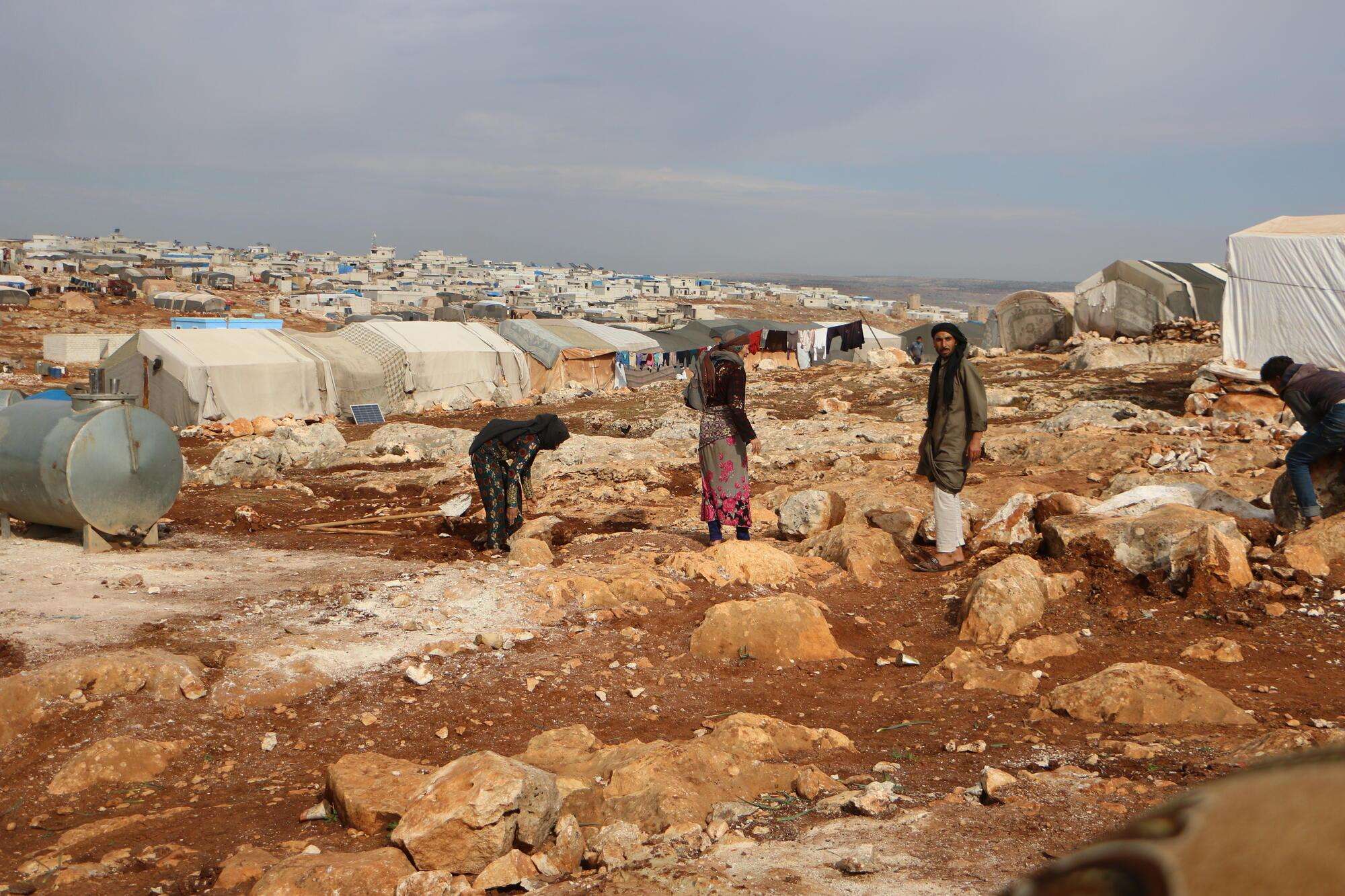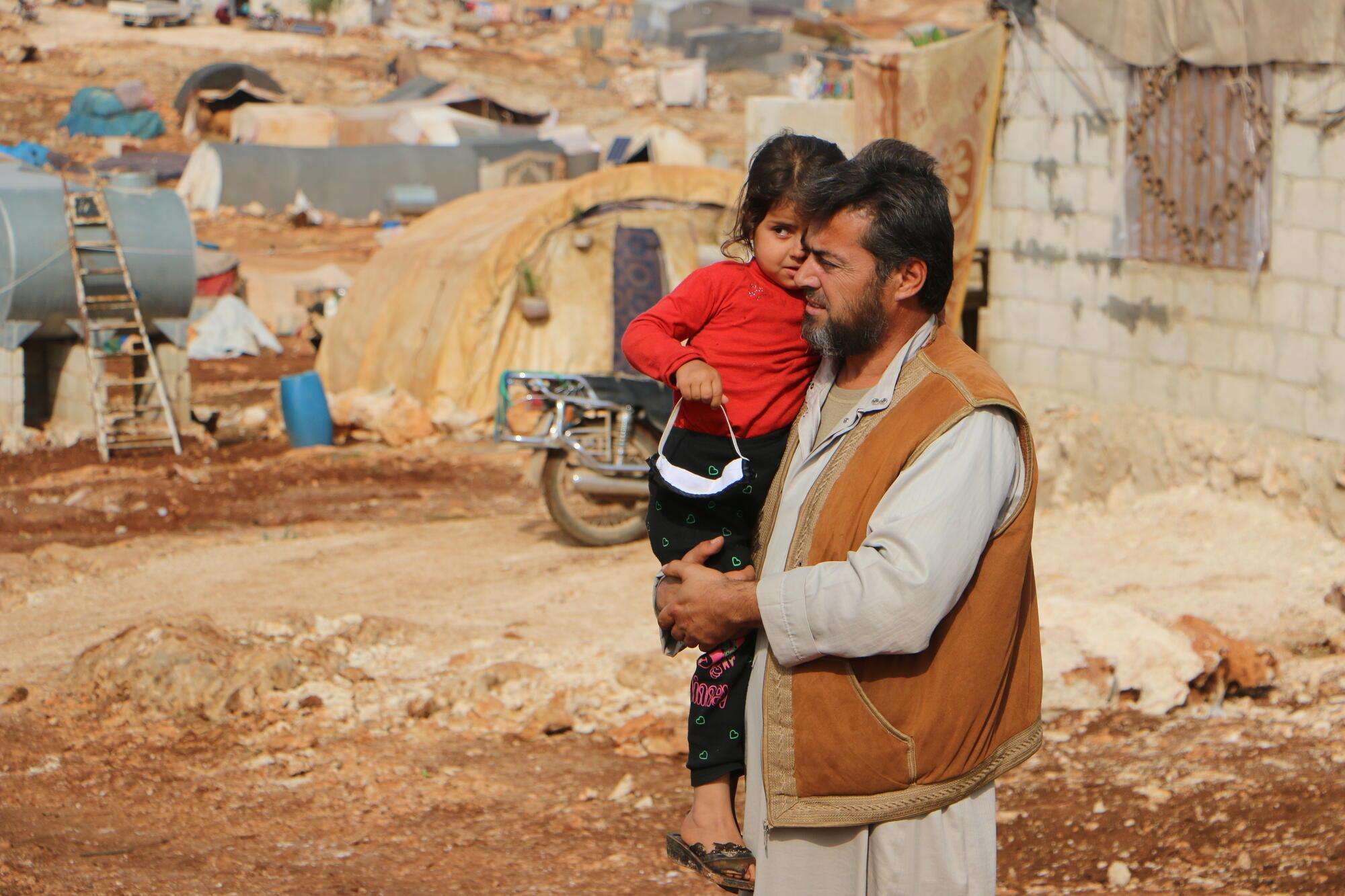Muhammad Hassan and his family were displaced to a camp in northwest Syria when their house was destroyed by intense bombing in 2019. Hassan’s leg was severely injured in the attack, forcing him to undergo a difficult surgery requiring the insertion of metal plates in his thigh. The ordeal has left him with chronic pain, along with deep psychological scars. But without access to even the most basic needs in the camp, it’s been nearly impossible for Hassan to recover.
“Our life in the camp is one of worry, anguish, and pain,” he says. “We suffer from the cold in winter and the extreme heat in the summer.” Muhammad is originally a farmer. His land was the source of his livelihood, and without it he’s lost the basic means to survive. Today he relies entirely on humanitarian aid. For the treatment of his leg, he goes to a hospital co-managed by Doctors Without Borders/Médecins Sans Frontières (MSF), where he gets free medical care.
Muhammad is one of around four million people living in northwestern Syria. Of that number, the United Nations estimates that at least 3 million require some form of humanitarian aid. Ten years of grinding conflict, the COVID-19 pandemic, and a severe economic crisis have exacerbated people’s vulnerability and their reliance on humanitarian aid in the region.
And things could get worse before they get better. People in northwestern Syria are now dreading July 10, 2021, which is when the UN Security Council’s authorization for cross-border humanitarian aid under resolution 2533 is set to expire. If it is not renewed, more than four million people—over half of whom are internally displaced—risk losing access to desperately needed humanitarian and medical aid.
“The activity of many humanitarian organizations has decreased lately, namely in water, sanitation, and hygiene services and food and hygiene kit distribution, so we tried to fill the gaps with this campaign,” says MSF logistics manager Osama Joukhadar. “But what we are suffering from is the increase of needs and the lack of resources in northwest Syria, and this will only get worse if Bab al-Hawa—the last border-crossing point into this area—gets closed."
“The needs remain tremendous”
2.7 million people in the region are internally displaced and more than half of them live in camps run by humanitarian organizations. Most of them are completely reliant on humanitarian assistance to survive. Many suffer from poor living conditions and a lack of mental health support and essential medical services like vaccination. Because of these gaps, treatable skin conditions such as scabies or leishmaniasis and chronic conditions like diabetes have become common in the region.
Across northwest Syria, MSF works to provide high-quality medical care, free of charge, both inside and outside the camps. Our services ranges from trauma and wound care to maternal and child health services, as well as vaccination campaigns aimed at preventing the spread of deadly diseases. We currently support eight hospitals in the region, including a burn unit and 12 primary medical care centers, five referral ambulances, and 14 mobile clinics in more than 80 camps.
“It might seem like humanitarian organizations are already providing a lot,” says Francisco Otero y Villar, MSF head of mission for Syria. “But the needs remain tremendous. Millions of people rely on humanitarian aid to survive in northwest Syria, and everywhere we look there’s a feeling that there is still more to be done to help people. But ongoing insecurity as well as access and supply constraints severely limit MSF’s and other actors’ ability to provide this desperately needed humanitarian assistance.”
“We live a really difficult life”
In another camp in northwest Syria, Omar Sarhan, who is also displaced, suffers from diabetes and hemiplegia [paralysis of one side of the body]. He cannot move his hand or leg and needs the help of his relatives to move around. Omar cannot work and relies completely on humanitarian aid as well. "I was displaced from my village a year ago and sought refuge in this camp, where we live a really difficult life,” he says. “The food we receive is very scarce, and sanitation is not good enough.”
One of the hardest things for Omar is using the camp’s toilets. The latrines are communal and located far from the tents. The path to reach them is rough and unpaved, making them particularly difficult for people like Omar, who uses a wheelchair, to reach.
In addition to medical activities, MSF also runs water, sanitation, and hygiene services in around 90 camps for displaced people in the region. Teams distribute hygiene kits including soap, towels, and sanitary products, builds latrines, improve sanitation, manage waste collection, and supply water tanks.
In June 2021 alone, MSF distributed 6,000 hygiene kits in 60 camps and more than 7.5 million gallons of water to more than 30,000 displaced people in the region. Our teams also built 100 latrines and distributed 240 latrine chairs for elderly and disabled people in 17 camps.
"The potential closure of the Bab al-Hawa crossing point is a concern for many people here, especially for the people in the camps,” says Joukhadar, the logistics manager. “If this crossing point were to be closed, it would cut off the lifeline providing people with aid. All our activities, as well as the overall humanitarian response in the region, would be compromised. It would only make the situation more alarming than it already is.”





